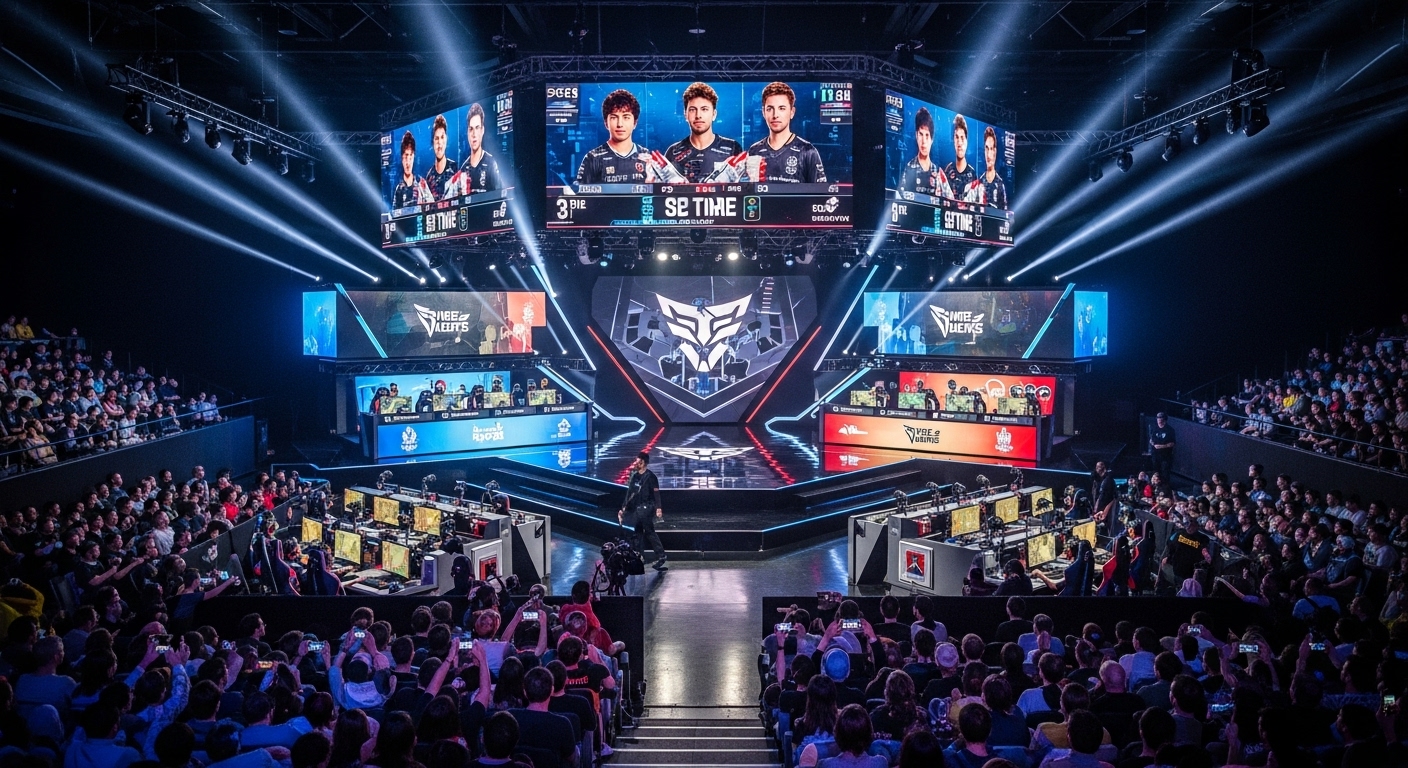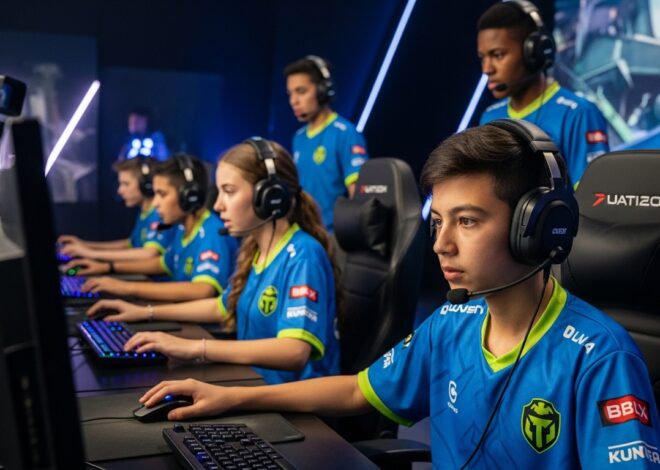
How Teams Build Trust Off the Screen
Introduction
In esports, where milliseconds and communication can decide the outcome of an entire match, teamwork is everything. While skill, strategy, and mechanical precision are often celebrated, one ingredient stands above them all — trust. Trust among teammates is what transforms a group of skilled individuals into a cohesive, unstoppable unit.
Yet trust isn’t built only through in-game performance or victory. It’s shaped and strengthened off the screen — in conversations, shared experiences, and mutual respect. Behind every successful esports organization lies a culture where players understand and rely on one another beyond their digital avatars.
In this blog, we’ll explore how teams build trust outside of competition, why it matters, and what specific practices top esports organizations use to nurture relationships that translate into better teamwork, communication, and long-term success.
The Importance of Trust in Esports Teams
Trust forms the backbone of any team-based activity, but in esports, it takes on a unique significance. Matches move at lightning speed, leaving no time for hesitation or doubt. Every player must believe that their teammates will make the right decisions, communicate accurately, and perform under pressure.
However, trust isn’t automatic — it must be earned. Many esports players come from different cultural backgrounds, languages, and gaming histories. Without real-life interaction and personal connection, misunderstandings can easily arise.
When trust is strong, communication flows freely, players support one another, and mistakes are handled constructively. When it’s weak, teams become fragmented. Players second-guess each other’s moves, arguments erupt, and morale plummets.
That’s why professional teams don’t just practice in-game strategies; they dedicate time to building human connections off the screen.
Understanding Trust Beyond Gameplay
Trust off the screen means believing in the person behind the username. It’s about knowing that your teammate respects you, listens to you, and has your back when things go wrong. It also means feeling comfortable expressing opinions, frustrations, or ideas without fear of judgment.
Building this kind of relationship takes consistent effort. It requires open communication, empathy, and shared experiences that create a bond beyond performance metrics.
In many esports teams, players live together in team houses or training facilities. This close proximity allows them to form personal connections — eating together, talking about non-gaming interests, and supporting one another through personal challenges. Over time, these interactions foster trust that carries over into competition.
Team Bonding Outside the Game
Team bonding is one of the most effective ways to strengthen trust among players. While in-game scrims and tactical discussions are vital, activities that take place outside of the competitive environment are equally important.
Shared Meals and Conversations
Something as simple as eating together can deepen relationships. Sharing a meal creates an informal setting where players can relax, talk, and connect. These moments of casual conversation often reveal personalities, humor, and empathy that might not surface during practice.
Outdoor Activities and Sports
Many esports organizations encourage players to engage in physical activities like going to the gym, playing basketball, or even hiking. Exercise releases endorphins, reduces stress, and builds camaraderie through teamwork in a different environment. It’s not about competition — it’s about connection.
Team Retreats
Some professional teams organize retreats or boot camps away from their usual settings. These events mix structured workshops with leisure time, helping players learn more about one another and reflect on their collective goals. Such experiences create memories and strengthen emotional ties.
Open Communication: The Foundation of Trust
Trust cannot exist without honest communication. When teammates communicate openly about strategies, expectations, and emotions, they create a culture of transparency.
Constructive Feedback
In esports, feedback is constant — reviewing gameplay, analyzing mistakes, and suggesting improvements. The tone and delivery of feedback are critical. Teams that focus on constructive criticism rather than blame foster trust and respect.
When players feel safe to admit errors or ask questions, the team grows stronger. Instead of hiding weaknesses, they confront them together.
Emotional Openness
It’s easy to forget that players are human beings with emotions, stress, and personal lives. Teams that encourage open discussion about mental well-being, stress management, and confidence issues often perform better in the long run.
A player who feels emotionally supported is less likely to burn out and more likely to stay committed to their team. Open communication creates empathy, and empathy strengthens trust.
Leadership and Team Culture
Leadership plays a pivotal role in establishing trust within an esports team. Whether it’s a coach, captain, or manager, leaders set the tone for how players interact.
Leading by Example
Leaders who demonstrate consistency, fairness, and accountability earn the respect of their team. When a captain admits mistakes, listens to feedback, and stays calm under pressure, teammates learn to do the same.
Building a Positive Culture
A healthy team culture is built on respect, inclusivity, and shared goals. Coaches who emphasize teamwork over individual performance create an environment where trust can thrive. When players feel valued for their contributions — not just their stats — they’re more likely to support one another.
Conflict Resolution
No team is free from conflict, but how conflicts are handled determines whether trust grows or breaks. Leaders must ensure that disagreements are resolved through discussion and understanding, not avoidance or resentment. A transparent conflict-resolution process reinforces fairness and accountability.
Cultural and Personality Differences
Modern esports teams often consist of players from different countries, languages, and cultural backgrounds. While diversity enriches a team with unique perspectives, it can also lead to miscommunication or misunderstandings.
To build trust across cultures, teams must make conscious efforts to understand and respect each other’s values. Language barriers, for instance, can be minimized through translation tools, language classes, or hiring bilingual coaches.
Beyond language, cultural habits — such as approaches to hierarchy, feedback, or humor — should be acknowledged rather than ignored. Teams that celebrate diversity rather than suppress it often find deeper, more meaningful trust.
Personality differences are another factor. Some players are extroverted and expressive, while others are introverted and prefer solitude. Recognizing these differences helps teammates adapt to one another’s communication styles. True trust comes from understanding, not uniformity.
Team Houses and Living Together
Many esports teams adopt a “team house” model, where players live and practice under one roof. While this setup has advantages, such as increased communication and shared routines, it also presents challenges.
Living together exposes players to each other’s habits, moods, and quirks. Friction is inevitable, but it can also become a powerful tool for building trust if handled properly. When teammates learn to respect boundaries, compromise, and support one another’s daily needs, they develop deeper bonds.
Team houses also foster spontaneous moments of connection — cooking together, watching movies, or celebrating victories. These shared experiences humanize teammates beyond their roles in the game.
However, balance is crucial. Without privacy or downtime, burnout and irritation can set in. The best organizations recognize the importance of personal space alongside team togetherness.
Shared Goals and Collective Vision
Trust grows when everyone moves toward a common goal. When players share a unified vision — whether it’s winning a championship, improving as a group, or growing their organization — they naturally support one another.
Teams that establish clear values and objectives off the screen are better equipped to handle in-game challenges. Shared goals align individual motivations, reducing internal competition or ego clashes.
When each member knows their role, respects the others’ contributions, and feels part of something bigger, trust becomes the glue that keeps the team united.
Building Trust Through Accountability
Accountability is another pillar of trust. It means owning mistakes, fulfilling responsibilities, and maintaining professionalism on and off the screen.
In esports, accountability shows through actions: showing up on time for practice, following schedules, communicating clearly, and maintaining discipline. When teammates consistently meet expectations, they prove reliability — a key component of trust.
On the flip side, when someone repeatedly neglects responsibilities, it undermines team confidence. Accountability should not be about punishment but about mutual respect and understanding. Teams that hold each other accountable in a supportive way build stronger bonds over time.
Team Psychology and Mental Conditioning
Many professional esports organizations now employ sports psychologists or mental coaches to help players build emotional intelligence and trust.
These specialists teach techniques for stress management, communication, and team cohesion. Group therapy sessions or trust-building exercises can help players open up about fears, frustrations, and personal experiences.
Through guided discussions, teammates learn empathy — seeing situations from one another’s perspectives. This emotional insight helps reduce tension during high-stakes matches and encourages cooperation.
The Role of Coaches in Trust Development
Coaches are not just strategists — they are mentors, mediators, and motivators. A good coach understands that trust begins off the screen, and they actively create environments that foster it.
Setting Clear Expectations
When coaches clearly define each player’s role, it eliminates confusion and resentment. Everyone knows what is expected of them, which builds reliability and transparency.
Recognizing Effort and Progress
Acknowledgment plays a huge role in trust development. When players feel their hard work is noticed, they feel valued and respected. Coaches who regularly celebrate progress, not just victories, maintain team morale.
Encouraging Collaboration
Coaches who promote collaboration rather than strict hierarchy empower players to contribute ideas and take initiative. This open approach increases mutual respect and strengthens group unity.
Trust-Building Exercises
Teams often use specific activities to strengthen bonds and develop trust. These can range from psychological exercises to simple group challenges.
- Story sharing: Players take turns sharing personal stories, allowing teammates to understand each other’s backgrounds.
- Problem-solving games: Non-gaming activities that require teamwork and communication reinforce cooperative thinking.
- Honesty circles: Structured discussions where players talk about what they appreciate in one another and what they need to improve.
- Goal mapping: Teams collaboratively define short-term and long-term goals to align vision and purpose.
While these exercises may seem small, they cultivate empathy, honesty, and understanding — all fundamental to long-term trust.
Handling Setbacks and Losses Together
How a team handles failure says more about its trust than how it celebrates success. In esports, losses are inevitable, and the emotional weight can be heavy.
Teams that approach losses as shared learning opportunities, rather than individual blame sessions, demonstrate maturity and unity. Discussing what went wrong and how to improve together reinforces collective resilience.
Trust allows players to admit mistakes openly without fear of ridicule. This transparency strengthens group integrity and prepares the team to bounce back stronger.
Long-Term Impact of Off-Screen Trust
The benefits of trust built off the screen extend far beyond team chemistry. It directly impacts performance, mental health, and organizational stability.
Teams that trust each other perform more consistently, communicate more clearly, and adapt better under pressure. Players who feel supported are less likely to experience burnout or conflict. Trust also improves retention — when teammates respect one another, they are more inclined to stay together, reducing turnover and preserving team identity.
In the long run, trust turns teams into families. It transforms competitive environments into communities built on mutual care and ambition.
Conclusion
In esports, trust is the invisible force that drives success. Mechanics, strategy, and communication may win matches, but trust is what sustains greatness. It’s built not just in the heat of battle, but in everyday moments — the conversations after practice, the shared laughter at dinner, the honest discussions during tough times.
Off the screen, teams become more than just players — they become friends, mentors, and partners in pursuit of a common dream. When that foundation of trust is solid, it translates into synergy on the battlefield.
Building trust off the screen requires time, empathy, and shared experience. But for teams willing to invest in it, the rewards are lasting: stronger unity, better performance, and a legacy built not only on wins but on relationships that endure beyond the game itself.


